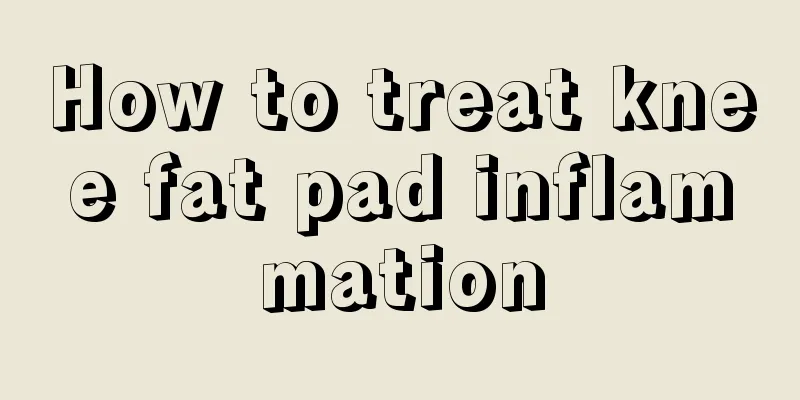How to treat knee fat pad inflammation

|
Boys love playing basketball, but they will suffer some injuries during the sport, especially knee injuries are the most common. Sometimes I feel my knees are swollen or painful. This may be fat pad inflammation. Its function is to lubricate the joints. When the lubrication is reduced, the friction of the joints will increase, causing discomfort. This article will take you through the process and types of fat pad inflammation to help you better understand it. Pain is the result of soft tissue injury that has not fully recovered. Soft tissue injury after joint injury causes meridian obstruction and blood stasis. Soft tissue injury refers to pathological damage to human skin, superficial and deep fascia under the skin, muscles, tendons, tendon sheaths, ligaments, joint capsules, synovial capsules, intervertebral discs, peripheral nerves and blood vessels caused by various acute trauma or chronic strain and invasion of wind, cold and dampness. Clinical manifestations: pain, swelling, deformity, and dysfunction. The main categories of soft tissue injury: sprains, contusions, and crushing injuries; acute tendon injuries, chronic tendon injuries; open injuries, closed injuries, etc. It is recommended to use topical medications for treatment. The traditional surgical plasters of Qiu Yitang Chinese Medicine can be applied to relax muscles and activate blood circulation, reduce swelling and relieve pain, activate blood circulation and disperse blood stasis, and dispel wind and cold. "Plasters for external application have strong local penetration. Drug molecules are absorbed through the skin to participate in blood circulation, reach the diseased area directly, and are transmitted through the skin to the meridians, tendons and bones, stimulate the body's regulatory function, promote functional recovery, and achieve rapid healing. Fat pad inflammation is a manifestation of inflammatory irritation in and around the adipose tissue due to stress on the plantar tendon after osteoporosis in the elderly, secondary bone hyperplasia, heel spurs or degeneration of the fat pad itself. It is a sterile inflammation in nature. This disease causes pain under the patella of the knee, which is related to frequent walking, weight bearing, physical decline, and recent significant weight gain. The tenderness point is in the middle of the patella. The characteristic is obvious pain when standing up suddenly after sitting for a while or when getting up after waking up from sleep, which will be significantly relieved after a while of activity. The reason is that the pain caused by inflammation stimulates the blood flow as the heel is squeezed against the ground, and the inflammatory substances are partially taken away, so the pain is relieved. Inflammatory substances are produced and accumulated here again when resting. Therefore, it will hurt when landing again. The location is in the fat pad under the heel, and the nature is aseptic inflammation. Pain is the result of soft tissue injury that has not fully recovered. Soft tissue injury after joint injury causes meridian obstruction and blood stasis. Soft tissue injury refers to pathological damage to human skin, superficial and deep fascia under the skin, muscles, tendons, tendon sheaths, ligaments, joint capsules, synovial capsules, intervertebral discs, peripheral nerves and blood vessels caused by various acute trauma or chronic strain and invasion of wind, cold and dampness. Clinical manifestations: pain, swelling, deformity, and dysfunction. The main categories of soft tissue injury: sprains, contusions, and crushing injuries; acute tendon injuries, chronic tendon injuries; open injuries, closed injuries, etc. It is recommended to use topical medications for treatment. The traditional surgical plasters of Qiu Yitang Chinese Medicine can be applied to relax muscles and activate blood circulation, reduce swelling and relieve pain, activate blood circulation and disperse blood stasis, and dispel wind and cold. "Plasters for external application have strong local penetration. Drug molecules are absorbed through the skin to participate in blood circulation, reach the diseased area directly, and are transmitted through the skin to the meridians, tendons and bones, stimulate the body's regulatory function, promote functional recovery, and achieve rapid healing. |
<<: The outside of the knee hurts when I press it
>>: Measures to prevent knee cracking when flexing and extending the leg
Recommend
Hepatitis A inactivated vaccine
There are many types of vaccines. When choosing a...
Coronary heart disease interventional treatment, pay attention to the method
Coronary heart disease is the abbreviation of cor...
Ankle fracture nail removal surgery
If the fracture is severe, steel nails will be in...
What are the symptoms of kidney cancer
The early symptoms of kidney cancer are often not...
What is the best time to brush your teeth in the morning?
Brushing your teeth in the morning is a necessary...
What to do if your voice is hoarse
With the society's advocacy of an environment...
Does folic acid replenish blood?
Folic acid is a familiar drug, and women should u...
Black teeth are hereditary
In daily life, everyone is paying attention to de...
Why do feet smell if there is no athlete's foot
Many people do not have athlete's foot, but t...
What should we pay attention to when having perianal abscess
In addition to paying attention to and following ...
What are the diagnostic and examination methods for colorectal cancer?
Colorectal cancer is a malignant tumor that serio...
Can people with high blood pressure eat eggs?
Eggs are the most indispensable ingredient in our...
I feel like vomiting when I smell the fragrance
Every girl loves beauty very much and often spray...
Is melanoma a familial genetic disease?
Melanoma is a common malignant skin tumor that is...
What to do if calf tendon is strained
If you strain your calf tendon, you can apply ice...









